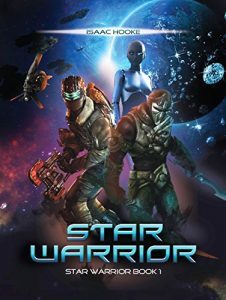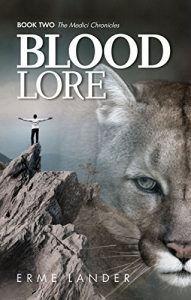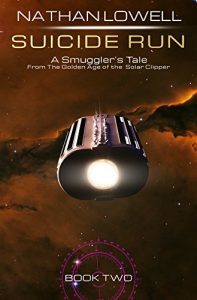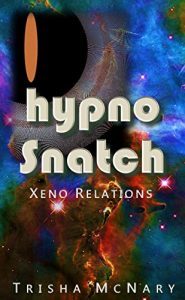Cora Buhlert's Blog, page 81
May 20, 2018
The Return of Detective Inspector Helen Shepherd in “Bloody Bananas”
I have two new releases to announce in the next few days.
As the post title indicates, the first of these new releases is a new Helen Shepherd Mystery. This is already the twelfth story featuring Helen and her team, making it my longest series to date.
The inspiration for this mystery was a news story about how cocaine packages were found inside banana crates at several Aldi discount supermarkets. The case made headlines, because the amount of cocaine seized was one of the largest in postwar Germany. And the police didn’t even have to do anything, they only needed to pick up the cocaine packages at Aldi, after the supermarket employees called them in. I even blogged about it at the time.
The news story about the cocaine packages found in banana crates at Aldi not only sparked a lot of jokes – “This week’s special at Aldi – Cocaine, fresh from Columbia” – but it also sparked an idea for a crime story. For what if the supermarket employees did not call the police, when faced with an unexpected delivery of cocaine? What if they decided to keep the drugs for themselves to sell them? And what if someone disagreed?
The ingredients were ideal for a murder mystery and so I turned them into a story and let Helen Shepherd and her team, including new additions Detective Sergeant Terrence Quincy of the drug squad and his detection dog Rex (“a highly qualified police officer who just happens to be a dog”), loose upon the case. There’s even time for a bit romance for Police Constable Martin Jackson who acquires a girlfriend in this story.
So what are you waiting for? Read…
Bloody Bananas
[image error]When supermarket employee Nelson Grant is found bludgeoned to death next to a half empty crate of bananas, the case seems a complete mystery. For Nelson Grant was well liked by his colleagues, so who could possibly want him dead?
But then Detective Inspector Helen Shepherd and her team discover that the crate contained more than just bananas and the case suddenly acquires a whole new dimension.
More information.
Length: 12300 words
List price: 0.99 USD, EUR or GBP
Buy it at Amazon US, Amazon UK, Amazon Germany, Amazon France, Amazon Netherlands, Amazon Spain, Amazon Italy, Amazon Canada, Amazon Australia, Amazon Brazil, Amazon Japan, Amazon India, Amazon Mexico, Kobo, Barnes & Noble, Apple iTunes, Google Play, Scribd, Smashwords, Inktera, Playster, Thalia, Weltbild, Hugendubel, Buecher.de, DriveThruFiction, Casa del Libro, e-Sentral, 24symbols and XinXii.
 Send to Kindle
Send to Kindle
May 19, 2018
Some Comments on the 2017 Nebula Awards Winners
So the 2017 Nebula Awards were awarded last night, as was the Palme d’Or (winner: Shoplifters by Hirokazu Kone-eda), the DFB cup (winner: Eintracht Frankfurt), the FA cup (winner: Chelsea). Oh yes, and there was a wedding in Britain, too.
I actually watched the Nebulas via the livestream this time (and for the record, I did not watch the royal wedding live – the snippets in the news were completely sufficient for me). I often have a podcast running in the background when I’m writing and last night, I simply left the Nebula ceremony running instead. Though when I tuned in, while the livestream was already in progress, I initially was confused, because instead of an awards ceremony, there was a bar diagram on the screen, breaking down genre fiction sales, while a voice detailed the market share of indie writers in the various SFF subgenres. For a second, I thought that I’d accidentally clicked on some indie publishing podcast, but no, I really had tuned into the Nebula ceremony, which apparently began with a presentation by Data Guy of Author Earnings Report fame.
After Data Guy had finished his report – which wasn’t all that surprising to those of us who’ve been hanging around indie publishing blogs and fora – a gentleman appeared on stage who turned out to be a puppeteer for the Jim Henson Company and one of the two people who play Mr. Snuffleuppagus. He briefly morphed into Snuffleuppagus mode – and I immediately recognised his voice and mannerisms, even though I haven’t actually watched US Sesame Street in ages and didn’t even know that Snuffleuppagus isn’t imaginary anymore – and also brought along two other Muppets. He was a great host BTW. All the awards should be presented by Muppets. At one point, a Muppet even cuddled with Patrick Rothfuss.
But now let’s get on to the winners. The full list is here, though they missed the Service to SFWA Award and this File 770 post also has some pictures of the ceremony. For my comments on the finalists, see this post.
The winner in the best novel category is The Stone Sky by N.K. Jemisin, who now has a Nebula to keep her two Hugos company. Now I’m not the world’s biggest fan of the Broken Earth trilogy, though it is a highly deserved win for the concluding novel in a trilogy that will be remembered for a long time. It’s also interesting that The Stone Sky and Six Wakes were the only two Nebula finalists this year that are also on the Hugo shortlist. Normally, there is a lot more overlap.
The winner in the best novella category is – unsurprisingly – All Systems Red by Martha Wells. It’s a great choice, because it’s a lovely story and Murderbot’s voice is a delight. BTW, the sequel Artificial Condition just came out. Currently, All Systems Red is duking it out for the number one spot on my Hugo ballot with River of Teeth by Sarah Gailey, which just happens to hit a lot of my sweet spots.
The winner in the best novella category is “A Human Stain” by Kelly Robson. I’ve all enjoyed all of Kelly Robson’s stories I’ve read so far, though I have to admit that I preferred Kelly Robson’t other 2017 story “We Who Live in the Heart” to “A Human Stain”. Though I find it interesting that what is basically a horror novelette won, since horror doesn’t normally do all that well at the Hugos and Nebulas.
The winner in the best short story category is “Welcome to Your Authentic Indian Experience(TM)” by Rebecca Roanhorse, a story that’s also on this year’s Hugo shortlist. It’s a fine story (and also one that borders on horror, interestingly) and a highly deserving winner. Coincidentally, I also think that this is the first time a Native American writer has won the Nebula, at least to my knowledge.
The Andre Norton Award for Best YA Novel went to Sam J. Miller for The Art of Starving. Now I like Sam J. Miller’s writing a whole lot and have been nominating stories of his for the Hugos several times now. However, I have to admit that I don’t love The Art of Starving, which is also on the ballot for the new YA not-a-Hugo, as much as the rest of his work. The central gay love story between two teens, one Muslim and one Jewish, is lovely, but I didn’t much care for the anorexia angle. It’s not a trigger for me – thankfully, I don’t have any eating disorders – it’s just a subject I don’t like reading about. The Art of Starving is also fairly light on the SFF content. Much of it reads like an updated and much better written version of the problem novels that were all the rage when I was the YA reading age and I never much cared about those.
The Ray Bradbury Award for Outstanding Dramatic Presentation, finally, went to Jordan Peele for Get Out! Now Get Out! is clearly one of the big surprise hits of 2017 and the first horror film to be nominated for the Best Motion Picture Oscar in more than forty years. Jordan Peele also took home a highly deserved Best Original Screenplay Oscar and might well win a Hugo, too. However, I find that I don’t love the film as much as many others obviously do. I think it’s partly because suburban horror is a very American subgenre – and many Non-Americans have been puzzled by the fact that many Americans obviously enjoy living in places that look like horror film settings for a long time now. And yes, we have suburbs, too, but ours are not quite as freakily homogenous as the American ones tend to be.
Rounding out the evening were a highly deserved SFWA Damon Knight Grand Master Award for Peter S. Beagle, a Kate Wilhelm Solstice Award each for Gardner Dozois and Sheila Williams and the Kevin O’Donnell Jr. Service to SFWA Award for Bud Sparhawk.
So let’s take a look at the winner demographics. Once again, the four adult fiction categories all went to women, two of them women of colour, for what I think is the third year in a row. However, lest the usual suspect worry that men are somehow being shut out of science fiction and fantasy, the winners of the Andre Norton Award and the Ray Bradbury Award this year were both men, Sam J. Miller and Jordan Peele respectively. However, Jordan Peele is not white and Sam J. Miller is not straight, so I fear the usual suspects won’t be placated either. Diversity count (leaving the special awards out for now): Three men, three women, three writers of colour, two LGBT writers.
All in all, this is a strong selection of Nebula winners, even if not every winner would have been my first choice. And with two blatant horror works, Get Out! and “A Human Stain”, as well as the borderline horror story “Welcome to Your Authentic Indian Experience (TM)” winning, this is also a surprisingly strong year for horror at the Nebulas. Meanwhile, Murderbot and “Welcome to Your Authentic Indian Experience (TM)” are holding up the flag for science fiction – everything else is fantasy to varying degrees.
Comments are off – I seem to have attracted some unwelcome attention in the past few days.
 Send to Kindle
Send to Kindle
May 15, 2018
“Baptism of Fire” is a nominee for the 2018 eFestival of Words Best of the Independent eBook Award
[image error]The nominations for the 2018 eFestival of Words Best of the Independent eBook Awards, which are run by the small press Bards & Sages, were announced today.
I was going to put the link to the announcement into the weekly link round-ups at the Speculative Fiction Showcase and the Indie Crime Scene respectively, but first I took a gander at the list of nominees and all but fell from my chair, because there, a bit down the page, was my name. For it turns out that “Baptism of Fire”, my contribution to the science fiction anthology The Guardian, edited by Alasdair Shaw, has been nominated in the “Best short story” category. I had absolutely no idea about this, until I saw the nominee list.
“Baptism of Fire” is a prequel story to my In Love and War series and features Anjali on her first very mission with the Shakyri Corps. The story was originally written during the 2017 July short story challenge. You can either get it as part of The Guardian, together with ten other great science fiction stories, or as a standalone edition for series completists.
I’m really happy about this nomination and thrilled to be in the company of so many other great books and stories by indie and small press authors, so many congratulations to my fellow nominees and thank you to everybody who nominated me.
 Send to Kindle
Send to Kindle
May 7, 2018
New Story Available: Blasters of Forever
It’s time for another new release announcement. While the last new release announcements were all parts of existing series, this story is a true standalone. It’s also something for those of my readers who enjoy the lighter and funnier side of my writing.
Blasters of Forever is another story to come out of the 2017 July short story challenge. One of the big challenges of the July short story challenge project – beyond writing a story every day – is coming up with ideas for a whole month worth of short stories. So I sometimes need a little help to generate story ideas.
And so I found myself looking around the various generator sites on the Internet, while doing the 2017 July short story challenge, and eventually came across something called , which generates names for the sort of toy franchises that come with tie-in cartoons. I played around with the generator and wrote down the best names I got, hoping that one of them would spark the inspiration for a story. In the end, however, I liked the various titles so much that I thought, “Why don’t I use all of them and write a story about someone who writes toy tie-in cartoons for a living?” And this is how Simon St. John and his many creations were born.
Now I have a deep and abiding love for cartoons, particularly for the toy tie-in cartoons of the 1980s. Of course, I know that they were basically just advertising, even though the toys they were advertising often weren’t even available in Europe. What is more, toy tie-in cartoons or indeed almost any kind of action cartoons were hardly ever seen on German TV in the pre-private television era, when only the most harmless and wholesome fare was permitted and even Porky Pig was cancelled as “too violent”. As for cartoons meant to advertise anything, including toys – forget it. That sort of thing was far too commercial and would never have been permitted.
However, in the 1980s my Dad worked in Rotterdam in the Netherlands and lived in an apartment which had cable TV, at a time, when cable TV was still a distant dream at home. Via cable TV, we received about ten different channels, which was a huge number in the three channel world of the pre-private TV era. Four of those channels were Dutch and Belgian TV (mostly dull, but sometimes it had cartoons and music), then we got the regular three German public channels (dull as usual) plus two German language private channels (much better, since they had soap operas and US TV shows).
But the very best TV channel available was the earliest incarnation of Sky, back when it broadcast nothing but music videos, 1960s US TV series and cartoons, lots of cartoons. The cartoons were broadcast in the context of a program called The DJ Kat Show, hosted by Linda de Mol and a puppet called DJ Kat. I loved The DJ Kat Show and in particular, I loved the cartoons. And the best cartoons were the many toy tie-in cartoons such as M.A.S.K., Jem, Transformers, Go-Bots, He-Man and the Masters of the Universe, She-Ra – Princess of Power, Bravestarr, Galaxy Rangers, Defenders of the Earth, Dungeons and Dragons, Thundercats, Care Bears, Rainbow Brite, My Little Pony and many others. I already homaged The DJ Kat Show in Cartoony Justice. Blasters of Forever is an homage to the cartoons I loved so much back in the day.
Rewatching some of these cartoons as an adult shows that much of what I loved about them existed merely in my head (and that I totally missed all the hints that many of the characters are gay – well, they had to be, considering how very few women there were), because frankly they are not very well made. The animation is jerky, the stories often make little sense, any depth the characters have existed primarily in my mind and the “morality bits” at the end are as patronising as I remember them. However, you cannot help but admire the enormous inventiveness displayed in stories whose main purpose was selling some pretty silly toys to children.
Regardless of their actual quality, the toy tie-in cartoons I watched as a kid had a huge influence on me and also on my writing. These neon-coloured adventures embedded themselves in my subconscious and bits and pieces of them quite frequently emerge in the stories I write today. And yes, it is kind of embarassing, when you realise that some of your best ideas can be traced to some rather silly cartoons whose main purpose was selling stupid toys. Therefore, Blasters of Forever is also a story about how – to quote Captain Chronos – inspiration can be found in the strangest of places.
Now we are living in an era where we regularly see big budget Hollywood adaptations of things none of us ever expected to see on the big screen, whether it’s a whole series of Transformers movies or the Marvel movies which give even the most obscure superheroes their moment in the spotlight. When they created the Marvel universe in the 1960s, Stan Lee, Jack Kirby, Steve Ditko et all could never have foreseen that these stories and characters would one day become bid budget movies and that they would break box office records. And whoever created the Transformers probably never expected to see a live action version on the big screen. Just as Simon cannot imagine the lasting impact his own throwaway creations will have.
I’ve noticed that stories about writers and their creations are one of the themes I keep coming back to. After all, I already wrote a story bringing a creator face to face with his creation in the “Crisis” portion of Muse and Crisis. And come to think of it, the Silencer stories also fall under the broad umbrella of stories about the relationship between writers and their creations, except that Richard Blackmore actually is the character he created or at least cosplays as the Silencer to fight crime.
The reunion of Steve, the protagonist of “Crisis”, and his character Channa is exactly a happy one – well, Steve does write dark and gritty comics. Meanwhile, Simon’s meeting with the Blasters of Forever is a much happier and lighter story, even if it is interrupted by a time travelling assassin. But then, the Blasters of Forever come from the generally goofy world of toy tie-in cartoons, where even the villains are not too villainous.
None of the toys and cartoons described in Blasters of Forever ever existed. However, they are not all that different from many that did. 1980s toy tie-in cartoons were full of cyborgs, dinosaurs, time travellers, talking dogs, teen pop stars and characters with very silly names. The voice chips, the colour-changing and transforming action and the infrared targeting were all used in real toys of the period, too. And yes, most of them never really worked as advertised. My lone Transformer has been a sportscar for ages, since no one can figure out how to safely transform him back. Coincidentally, Simon’s magnum opus People on a Bridge never existed either, for which we can be thankful, for it’s easy to imagine just how awful that movie would have been.
Designing a cover for Blasters of Forever was something of a challenge, because 1980s cartoons had a very distinctive look that’s not easy to capture. Luckily, I came across the striking pop art inspired graphics of Valeriy Kachaev, which were perfect for my purpose. The character depicted is clearly Amy Extreme – dancer, cyberneticist and Kung Fu blackbelt – because Felicia Galaxy, the other female member of the Blasters of Forever, is black. The typography and the garish and clashing colours are also inspired by real cartoon logos of the 1980s.
So let’s step back in time and prepare to meet the Blasters of Forever, time cops with superpowers, as they meet their creator and inspiration Simon St. John. But of course, mayhem ensues, for the evil Doctor Chronos never rests…
Blasters of Forever
[image error]1985: Screenwriter Simon St. John makes his living writing toy tie-in cartoons and dreams of finally getting his screenplay “People on a Bridge” produced.
But one night, when Simon has just come up with his latest creation, a group of time travelling cops known as the Blasters of Forever, a portal opens inside his living room. Out of the portal hop none others than the Blasters of Forever or at any rate, people who look very much like them.
The Blasters explain that they are from the future, where Simon is considered not just one of the greatest creative minds of the twentieth century, but also the inspiration for the time travel program that eventually led to the formation of the Blasters of Forever.
However, not just the Blasters of Forever are real. The villainous Doctor Chronos, sworn enemy of the Blasters of Forever, is real as well. And so is his cadre of time travelling assassins.
More information.
Length: 5500 words
List price: 0.99 USD, EUR or GBP
Buy it at Amazon US, Amazon UK, Amazon Germany, Amazon France, Amazon Netherlands, Amazon Spain, Amazon Italy, Amazon Canada, Amazon Australia, Amazon Brazil, Amazon Japan, Amazon India, Amazon Mexico, Kobo, Barnes & Noble, Apple iTunes, Google Play, Scribd, Smashwords, Inktera, Playster, Thalia, Weltbild, Hugendubel, Buecher.de, DriveThruFiction, Casa del Libro, e-Sentral, 24symbols and XinXii.
 Send to Kindle
Send to Kindle
May 4, 2018
Remembering Wolfgang Völz (1930 – 2018)
German actor Wolfgang Völz died today aged 87. Here is a video obituary with clips of some of his most famous parts.
Wolfgang Völz was a German TV legend. If you watched TV in Germany at some point in the past sixty years, you have seen Wolfgang Völz and you have definitely heard his voice, because Völz was also a prolific voice actor, lending his distinctive voice to Walter Matthau, Peter Ustinov, Peter Falk, Mel Brooks, Majestix, the Gallic chieftain from the Asterix and Obelix films, as well as dozens of puppet and cartoon characters. It’s certainly fitting that Wolfgang Völz’s last credited role was the voice of God in the 2012 movie Der Gründer (The Founder).
However, the part which I will always associate with Wolfgang Völz is that of Lieutenant Mario de Monti, weapons officer aboard the fast cruiser Orion in the German science fiction series Raumpatrouille – Dia phantastischen Abenteuer des Raumschiffs Orion. In many ways, Mario de Monti was typical of the sort of characters Wolfgang Völz played – the joker, the good friend, the guy you’d want to have a beer with. His wife Roswitha Völz also appeared in Raumpatrouille Orion, by the way, as a dancer in the famous Starlight Casino dance sequences. With Wolfgang Völz’s death, almost the entire Orion cast is gone. The only surviving members of the cast are Thomas Reiner and Friedrich G. Beckhaus, who is the sole survivor of the actual Orion crew, since Thomas Reiner played an earth-based military official.
Raumpatrouille Orion wasn’t Wolfgang Völz’s only foray into the science fiction genre. For in 1979, he lent his voice to the android Otho for the German broadcast of the anime series Captain Future, based on Edmond Hamilton’s eponymous pulp novels of the 1940s. The constant bickering between Otho and the robot Grag, voiced by fellow Orion alumnus Friedrich G. Beckhaus, was a true delight and quite often overshadowed Captain Future, the nominal hero of the series. Both Raumpatrouille Orion and Captain Future (and therefore Wolfgang Völz) are what ignited my love for science fiction, together with the original Star Trek, Star Wars and Time Tunnel. And considering what a prolific voice actor Völz was, I wouldn’t be surprised if his voice turned up somewhere in Star Trek, Star Wars and Time Tunnel as well. Considering that Wolfgang Völz was the German dubbing voice of Mel Brooks, he was very definitely in Space Balls.
But even though I mainly associate Wolfgang Völz with his science fiction roles, he did so much more. Looking at shows that he was literally in everything. In the 1960s, he appeared in the popular crime series Stahlnetz (Steel net) and Graf Yoster gibt sich die Ehre (Count Yoster has the honour), where he played the butler of the crime-busting count. He had a small part in Fritz Lang’s 1960 thriller Die 1000 Augen des Dr. Mabuse (The 1000 Eyes of Dr. Mabuse), which brought the great body-hopping supervillain Dr. Mabuse into the 1960s. Coincidentally, the Dr. Mabuse films definitely count at least as borderline science fiction, though 1000 Eyes is one of the more subdued ones. Like pretty much every German actor in the 1960s, Wolfgang Völz also appeared in the Edgar Wallace film adaptations, most notably as bumbling Sergeant Higgins in The Green Archer in 1961. Higgins was eventually promoted to inspector and was played by the more classically heroic looking Joachim Fuchsberger from that point on, but Wolfgang Völz lived long enough to portray Sir John, the head of Scotland Yard, in the 2004 Edgar Wallace parody Der Wixxer and its sequel Neues vom Wixxer.
Wolfgang Völz was also strongly associated with children’s television, particularly due to his voice acting work, and appeared in many SFF films and TV shows for kids. He played a pirate in the 1970 Astrid Lindgren adaptation Pipi in Taka-Tuka Land and an aristocratic major in the 2006 film Hui Buh – Das Schlossgespenst (Hui Buh – The Castle Ghost). He voiced the Blue Klabauter in the Pumuckl cartoons, the melancholic sea elephant in the cartoon adaptation of Max Kruse’s Urmel aus dem Eis (Urmel from the Ice) and Yetipletikreti in the cartoon adaptation of Michael Ende’s Jim Knopf and Lukas, the Train Engine Driver.
However, the part with which everybody who was a child in Germany in the 1990s and beyond will associate Wolfgang Völz is that of Käpt’n Blaubär (Captain Bluebear in English), the sailor’s yarn spinning retired sea captain who just happens to be a blue-furred bear. Käpt’n Blaubär was created by writer and cartoonist Walter Moers, but it was the voice of Wolfgang Völz that brought him to life.
I was already out of the children’s TV age by the time Käpt’n Blaubär premiered in Die Sendung mit der Maus (The Show with the Mouse). But considering how beloved the Käpt’n Blaubär character is, almost eclipsing the Mouse itself in fame, it is only fitting to end this post with the following tweet of the Die Sendung mit der Maus Twitter account.
Auf Wiedersehen, Wolfgang Völz. Danke, dass du Käpt‘n Blaubär deine unverwechselbare Stimme gegeben hast. Du wirst immer bei uns sein! #blaubär #diemaus pic.twitter.com/zSwvO5dHXE
— Sendung mit der Maus (@DieMaus) May 4, 2018
 Send to Kindle
Send to Kindle
April 29, 2018
Indie Speculative Fiction of the Month for April 2018
 It’s that time of the month again, time for “Indie Speculative Fiction of the Month”.
It’s that time of the month again, time for “Indie Speculative Fiction of the Month”.
So what is “Indie Speculative Fiction of the Month”? It’s a round-up of speculative fiction by indie authors newly published this month, though some March books I missed the last time around snuck in as well. The books are arranged in alphabetical order by author. So far, most links only go to Amazon.com, though I may add other retailers for future editions.
Once again, we have new releases covering the whole broad spectrum of speculative fiction. This month, we have epic fantasy, urban fantasy, historical fantasy, paranormal mystery, paranormal romance, science fiction romance, space opera, military science fiction, near future science fiction, science fiction mystery, science fantasy, post-apocalyptic fiction, alternate history, horror, weird fiction, non-fiction collections, dragons, knights, dark elves, gargoyles, grim reapers, shifters, superheroes, airships, aliens, mercenaries, yakuza, space mages, mutants, killer plagues, windwalkers, space cops, lovers on the run, foiled weddings, Bonnie and Clyde redeemed, new books by a Hugo finalist, a Nebula finalist and a Kitschies winner and much more.
Don’t forget that Indie Speculative Fiction of the Month is also crossposted to the Speculative Fiction Showcase, a group blog run by Jessica Rydill and myself, which features new release spotlights, guest posts, interviews and link round-ups regarding all things speculative fiction several times per week.
As always, I know the authors at least vaguely, but I haven’t read all of the books, so Caveat emptor.
And now on to the books without further ado:
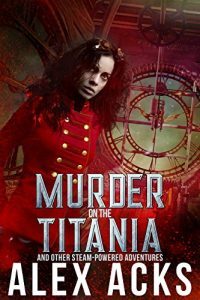 Murder on the Titania and Other Steam-Powered Adventures by Alex Acks:
Murder on the Titania and Other Steam-Powered Adventures by Alex Acks:
Captain Marta Ramos, the most notorious pirate in the Duchy of Denver, has her hands full between fascinating murder mysteries, the delectable and devious Delilah Nimowitz, Colonel Geoffrey Douglas (the Duke of Denver’s new head of security), a spot of airship engineering and her usual activities: piracy, banditry and burglary. Not to mention the horror of high society tea parties. In contrast, Simms, her second in command, longs only for a quiet life, filled with tasty sausages and fewer explosions. Or does he? Join Captain Ramos, Simms and their crew as they negotiate the perils of air, land and drawing room in a series of fast-paced adventures in a North America that never was.
Murder on the Titania and Other Steam-Powered Adventures includes 4 novellas and a short story about piracy, banditry, burglary, jail-breaking, several brilliant bits of detective work and all manner of otherwise lawless hijinks performed by the valiant Captain Ramos and her crew.
Murder on the Titania: Colonel Geoffrey Douglas, the Duke of Denver’s new head of security, is drawn into a high society murder mystery on the Airship Titania. None of the passengers are quite what they seem, including the mysterious young woman who always turns up where she is least expected.
The Curious Case of Clementine Nimowitz (and Her Exceedingly Tiny Dog):
A simple burglary goes horribly awry when Captain Ramos and Simms stumble across a dead body, a small dog and the deceased’s heirs, the noisome Morris and the rather too interesting Delilah.
The Jade Tiger: a mysterious woman enlists Captain Ramos’s aid in getting her revenge on her former employer and Captain Ramos finds herself doing an unintentional good deed.
The Ugly Tin Orrery: Captain Ramos and her crew embark on what appears to be a perfectly ordinary train robbery, only to be drawn into the Duke of Denver’s political machinations via a strange metal artifact. Throw in a spot of jail breaking and an encounter with the lovely Delilah, and it’s all in a day’s work for Captain Ramos and Simms.
The Flying Turk: The Airship Titania is entering a new era and welcoming its first automaton pilot. Or, perhaps not. Captain Ramos and Simms are back aboard the Titania for a heady mix of murder, robbery, peeved scientists and oblivious peers, with a spot of engineering thrown in.
[image error] The Knight’s Secret by Jeffrey Bardwell:
Sir Corbin, the retired Hero of Jerkum Pass, rides for honor, glory, and his pension with the aid of a magic ring. The knight’s mission takes him to the capital of the Iron Empire. The city is in an uproar. The emperor has been slain by rogue mages. The new empress is livid. Soon all mages are suspect . . . including Corbin’s daughter.
When Corbin dies on the eve of the mission, his granddaughter Kelsa dons his armor, his manner, and his face to save her mother. Hidden behind the magic ring, she infiltrates his old regiment. The army has become a slithering nest of vipers. Imperial mages and cavalrymen move warily around each other. Both sides snare the disguised hero in tight coils of suspicion, politics, and lies. When the vengeful empress launches a vendetta against all mage kind, Kelsa must decide whether to save her family or preserve the empire.
Unravel The Knight’s Secret, the first fantasy adventure of The Mage Conspiracy series. Discover a world of lurid entanglements and political intrigue where lies cut deeper than any sword.
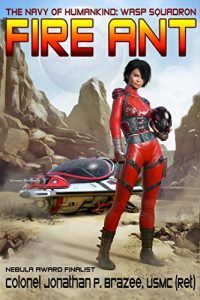 Fire Ant by Jonathan P. Brazee:
Fire Ant by Jonathan P. Brazee:
Floribeth Salinas O’Shae Dalisay is an Off-Planet Worker, employed as an exploration pilot by the giant corporation, Hamdani Brothers. Sent on a routine mission to analyze one of the millions of systems in the galaxy, she stumbles across something that could threaten humanity’s very existence. She barely escapes with her life, but in the process, has to shut down her scout’s AI.
As with all OPWs, she has few rights, and instead of being lauded as a hero, the corporation thinks she is lying. Her managers believe she found something valuable and shut down her AI in an attempt to hide that fact, hoping she can sell that information to the highest bidder. Grounded, and with a huge debt now over her head, Beth has to convince the powers that be that a very real danger to humanity is lying in wait out there in deep space.
 C.H.U.D Lives! A Tribute Anthology, edited by Eric S. Brown:
C.H.U.D Lives! A Tribute Anthology, edited by Eric S. Brown:
Today’s top Horror and SF authors pay tribute to C.H.U.D. in this anthology of original fiction.
C.H.U.D. is a genre defying, cult classic film featuring monsters living in the sewers below New York. The stories in this anthology expand the world created by the film and add depth to the C.H.U.D. universe like never before. From stories of apocalyptic horror and all out monster action, to tales of underground parties interrupted by uninvited guests and evening strolls that end in death, this anthology will leave you both smiling and breathless.
Relive the fear as these original stories take you beyond the movie to events that occurred before, during, and after the scenes we remember so well.
Includes C.H.U.D. related stories by Jonathan Maberry, Tim Waggoner, JG Faherty, Mort Castle, Michael H. Hanson, Martin Powell, Ben Fisher, Jason White, Chad Lutzke, Ross Baxter, Philip C Perron, David Bernstein, Nick Cato, Alex Laybourne, Christopher Fulbright, Angeline Hawkes, David Robbins, Robert Waters, Greg Mitchell, Ryan C. Thomas, and Eugene Johnson.
With an introduction by David Drake. Compiled by Eric S. Brown.
C.H.U.D. Lives! also features in-depth interviews with Andrew Bonime (producer) and Parnell Hall (screenwriter), as well as never before seen behind-the-scenes photos from the classic 80s horror film.
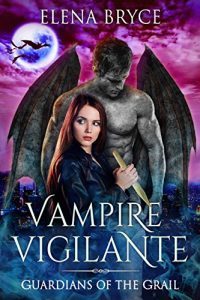 Vampire Vigilante by Elena Bryce:
Vampire Vigilante by Elena Bryce:
A kick-ass heroine and a gargoyle with a stone age view of women
Iona Thorn is an immortal with a gift. She can see into the hearts of man and know exactly how much evil dwells there. But as a Guardian, Iona won’t take a human life, no matter how corrupt they may be. Instead she uses her talents to rid the world of the darker strain of vampires, and L.A. is rife with them.
While battling to hold on to her most treasured possession, a stake that contains a genuine nail of the cross, Iona accidentally awakens a gargoyle. Edrick might share her passion for justice, but he has the manners and instincts of another era, and is determined to protect her, even from herself.
Iona wants to reclaim her holy stake, but the enemy may be too formidable to beat, unless a strapping hunk of stone can be convinced to weigh in. But the longer Edrick remains awake the weaker he gets, and even a rock can break…
[image error] Freedom’s Horizon by Cora Buhlert
Once, Anjali Patel and Mikhail Grikov were soldiers on opposing sides of an intergalactic war. They met, fell in love and decided to go on the run together.
Now Anjali and Mikhail are trying to eke out a living on the independent worlds of the galactic rim, while attempting to stay under the radar of those pursuing them.
After a run-in with a Republican spy on the rim world of Metra Litko, Anjali and Mikhail need to get off planet fast. So they sign on as security aboard the freighter Freedom’s Horizon, which is supposed to transport a valuable cargo through pirate infested space.
But they have far bigger problems than pirates, for the Republic of United Planets sends no less than three battlecruisers after them, commanded by none other than Colonel Brian Mayhew, Mikhail’s former superior and now their most determined pursuer.
The chase culminates in a stand-off in orbit around Metra Litko, where Anjali and Mikhail have to make a fatal choice. Fight and endanger the innocent crew of the Freedom’s Horizon or surrender and face death and worse at the hands of the Republic.
This is a short novel of 55000 words or approximately 185 print pages in the “In Love and War” series, but may be read as a standalone.
[image error] Double-Cross by Cora Buhlert:
Once, Anjali Patel and Mikhail Grikov were soldiers on opposing sides of an intergalactic war. They met, fell in love and decided to go on the run together.
Now Anjali and Mikhail are trying to eke out a living on the independent worlds of the galactic rim, while attempting to stay under the radar of those pursuing them.
When they are hired to retrieve a shipment of bootleg medical nanobots, it seems like a routine job at first. But it quickly turns out that they are not the only ones who are after the nanobots. And their client has an agenda of her own.
This is a story of 5100 words or approx. 20 print pages in the “In Love and War” series, but may be read as a standalone.
[image error] Oaths by Lindsay Buroker:
General Ridgewalker Zirkander is getting married.
Sardelle—the woman who’s battled dragons, shamans, and countless enemy soldiers at his side—has accepted his proposal, and it’s the perfect time for a wedding. It’s been two months since any dragons or sorceresses attacked the city, the Cofah haven’t come after their kidnapped emperor, and King Angulus has stopped yelling at Ridge for his inadvertent role in destroying the castle.
Yes, it’s the perfect time for a wedding.
Never mind that the resident dragon who thinks he’s a god is pressuring Ridge to build a temple for him, or that the pirate-turned-scientist Tolemek has disappeared. Or that Ridge’s mother is on the verge of discovering that magic exists and her future daughter-in-law is a sorceress. These are small hiccups, and the wedding will go smoothly. Ridge is sure of it. Really.
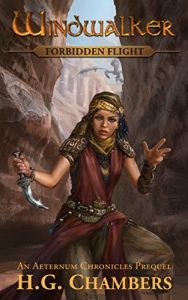 Windwalker: Forbidden Flight by H.G. Chambers:
Windwalker: Forbidden Flight by H.G. Chambers:
Sixteen-year-old Kiva Fariq has always dreamed of soaring on the four-winged raptors that scour the desert skies. But the windwalker sect is closed off to women. What’s more, it’s said the deadly predators can only be bonded by men.
Undeterred, Kiva attempts the deadly windwalker trials in secret. Should she survive, she will face an even greater challenge: bonding a raptor of her own. When signs of an ancient enemy appear upon the plains, she desires more than ever to protect her people. But the threat is closer than anyone realizes, and will soon bury them all in a tomb of sand and stone—unless she can stop it.
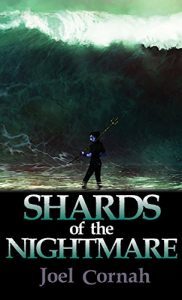 Shards of the Nightmare by Joel Cornah:
Shards of the Nightmare by Joel Cornah:
They expected her to die within hours of being born, this strange child with blue skin. But she grew; unnatural, wild, curious and defiant.
And then her mother found the Sea-Stone Sword, and her father became a tyrant.
Torn between who she is and who she wants to be, Sini follows her bodyguard into the forgotten lands and the forbidden seas, searching for an answer that the Seers have sought for centuries: how can they defeat a tyrant? How can the Sea-Stone Sword be silenced?
And the answer lies in the Shards of the Nightmare.
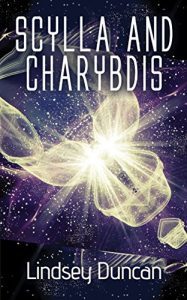 Scylla and Charybdis by Lindsey Duncan:
Scylla and Charybdis by Lindsey Duncan:
Anaea Carlisle, raised on an isolated space station populated solely by women, believes the rest of the universe has been plunged into anarchy and ruin by an alien-engineered disease known as Y-Poisoning. On a salvage mission, she helps rescue a hypermental named Gwydion who challenges everything she thought she knew.
Forced to flee the station with Gwydion, Anaea finds herself in an inexplicable, often hostile world, permanently divided between the Galactic Collective and the Pinnacle Empire. She longs for some place to call home, but first, she’ll have to survive …
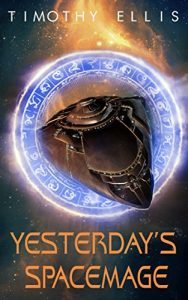 Yesterday’s Spacemage by Timothy Ellis
Yesterday’s Spacemage by Timothy Ellis
Pirates and Slavers Beware, the Space Mage is coming for you!
All Thorn wanted, was to be a Battle Mage.
He had the talent, and his whole future was before him.
On the day of Choosing, he finds things don’t always go as planned. Suddenly Thorn’s life is thrown into fast forward, and he finds himself in a world not of his own choosing.
In a world of spaceships and blasters, instead of horses and swords, Thorn needs to adapt and survive, make new allies, and rediscover that although nothing is familiar, he’s still a Mage, and pirates and slavers beware.
Yesterday is history, and today he’s become, Yesterday’s Spacemage.
[image error] The Big Bumper Felapton Digest 2017 by Camestros Felapton:
An exciting compilation of essay, pictures and nonsense from the 2018 Hugo Award Finalist for Best Fanwriter, Camestros Felapton. Featuring Timothy the Talking Cat and Susan Triceracopter, the collection is a meandering sample of posts from the eponymous blog camestrosfelapton.wordpress.com. Covering topics such as The Last Jedi, Doctor Who and the sureal politics of 2017, the digest is Lancashire hotpot of gravy, potatoes and strange bits of meat in a tasty gravy. Enjoy!
 Magic After Midnight by C. Gockel:
Magic After Midnight by C. Gockel:
Magic is real, and Marcia’s life is a fairy tale. Except, according to her stepdaughter, she’s the wicked stepmother. Undermined by a meddling godmother, Marcia is struggling to raise three teenagers in a world of enchantment and monsters. When she’s introduced to a Night Elf who appears half her age, love is the last thing on her mind.
Count Darerick Razvano is a Night Elf–please don’t call him a vampire! Fighting for the survival of his race, he has no time for matters of the heart. When a charming widow inadvertently threatens the Night Elves’ most carefully guarded secret, Darerick must seek Marcia out to save his people.
Marcia’s devoted to get children. Dare’s determined to save his race. They aren’t looking for love, but love might find them.
In a world of monsters, love may save Night Elves and humans alike.
A standalone, slow burn, paranormal romance in the world of I Bring the Fire.
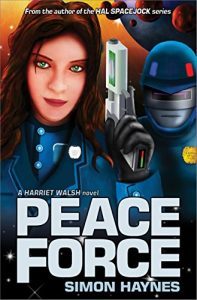 Harriet Walsh: Peace Force by Simon Haynes:
Harriet Walsh: Peace Force by Simon Haynes:
Harriet Walsh is desperate for work, but when an intergalactic crime-fighting organisation offers her a job she’s convinced it’s a mistake. She dislikes puzzles, has never read a detective mystery, and hates wearing uniforms. So why did the Peace Force pick her?
Who cares? Harriet needs the money, and she’s happy to go along with the training for as long as they keep paying her. She’d better dig out some of those detective mysteries though, because she’s about to embark on her first real mission…
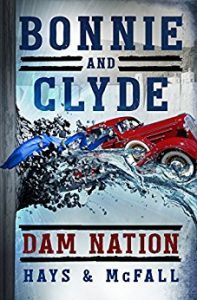 Bonnie and Clyde: Dam Nation by Clark Hays and Kathleen McFall:
Bonnie and Clyde: Dam Nation by Clark Hays and Kathleen McFall:
THE REDEMPTION OF BONNIE AND CLYDE
Saving the working class from a river of greed.
The year is 1935 and the Great Depression has America in a death grip of poverty, unemployment and starvation. But the New Deal is rekindling hope, with federally funded infrastructure projects, like Hoover Dam, putting people back to work. Set to harness the mighty Colorado River for electricity and irrigation, the dam is an engineering marvel and symbol of American can-do spirit.
So, why is someone trying to blow it up?
When an informant on the construction site is murdered, Bonnie and Clyde—spared from their gruesome deaths and forced into a covert life working for the government—are given their second assignment: stop the bomb and protect the thousands of laborers and families in the company town. It’s their most dangerous mission yet: working for a living.
Can the notorious lovers put aside their criminal ways long enough to find out who wants to extinguish the American dream, and hopefully reclaim a shred of redemption along the way?
The thrilling story cuts back and forth between the modern era where a reporter interviews the now-elderly Bonnie Parker, and the dangerous 1930s undercover exploits of Bonnie and Clyde, as they are thrust into a fight to defend the working class against corporate greed.
Dam Nation continues the explosive “what-if” series about two unlikely heroes fighting to defend the working class during America’s Great Depression, a historical thriller with unsettling contemporary parallels.
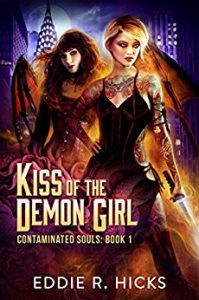 Kiss of the Demon Girl by Eddie R. Hicks:
Kiss of the Demon Girl by Eddie R. Hicks:
Ruthless, foulmouthed, and sometimes drunk. That’s me on a good day. Just imagine what I’m like on a bad day.
My name is Reika. I don’t know who I am anymore other than the following facts:
I’m unlikeable.
I used to be a member of the Yakuza.
I think a succubus has a thing for me.
The police shot me six times.
After my discharge from the hospital I learned that I had the unique talent to control fire. That’s right, a modern day pyromancer. I have no idea where these powers came from, the doctor that worked on me upped and vanished, along with all records of me ever being admitted to the hospital.
That’s when shady people from the shadows began to stalk me, some even had the balls to attack me. Don’t worry, I flambéed them all, I can take care of myself. What I am worried about are the people of New York City. Who’s going to defend them when my war with these shadow people reaches a boiling point?
I don’t want to be a heroine. I just want my life back.
In a galaxy where the fabric of reality can be bent and shaped by a privileged few, and almost any skill desired is a mere injection away, one young man is thrust into the fight of his life.
Tane, a hydroponics engineer with some mean crop gene-splicing skills, decides to get chipped. The operation gives him full control over his autonomic nervous and endocrine systems, plus the ability to install custom memories.
All seems well until a couple of days later aliens come knocking at his door. And they aren’t the friendly type.
Soon Tane finds himself on a frenzied flight across the galaxy with a woman who can warp the very fabric of spacetime, her partner–who’d just as soon kill Tane than protect him–and a starship that calls him snarky pet names. He’s on the run not simply from the aliens but the whole damn human space navy.
He only wished he knew why.
Unfortunately for Tane, the answer might just destroy him. Not to mention the entire known universe.
 Rectifier – The Electric Man by Brian D. Howard:
Rectifier – The Electric Man by Brian D. Howard:
Oliver Stewart just wanted to be left alone after his life fell apart. He never expected to be kidnapped by a secret lab and dumped in a mass grave, left for dead as a failed experiment.
Except it didn’t fail.
Now he can control electricity.
When the people he feels most responsible for, some only teenagers, are abducted by the same men in their van, the clock ticks down before they end up dead—or worse.
To save them he’ll have to confront his most shameful mistakes, find the lab to mount an impossible rescue, and pick sides in a vicious gang war with far-reaching implications.
This gritty, must-read adventure is the second book in the After the Crash superhero series but stands alone as a complete story.
 Blank Tapes Volume 2: more weird and dangerous tales, edited by Paul Huxley:
Blank Tapes Volume 2: more weird and dangerous tales, edited by Paul Huxley:
‘blank tapes’ returns with 17 new weird and dangerous tales. This is not a typical collection of stories. If you feel discomfort, uneasiness, a sense of disassociation and mild paranoia after reading these stories the publisher cannot be held responsible.
‘blank tapes’ is a challenging and daring mix of poetry, experimental fiction and short stories with dark themes. It is not for the faint of heart, weak of bladder and narrow of mind. Inside you will find missives from the outer parts of human experience, and a few from beyond that, which have slipped through the cracks in reality to find their way into your hands.
PERIMETER – Deceit has no boundaries
Joe Ballen’s working on a new ore-processing platform in the harsh environment around Mercury. When a savage Atoll attack decimates his crew, Joe is injured and must return to Earth to recover. While it’s a setback for the project, at least it means he can rebuild his relationship with his wife after nearly a year away.
But then the security forces come calling. Vital starship engineering files are missing, and without them Earth has no hope of escaping Atoll domination. Someone has to locate the files, and Ballen is bulldozed into the not-so-choice assignment.
But he’s not the only one in the hunt. As Joe struggles to find the data, he becomes tangled up in a high-stakes game of cat and mouse. It’s a journey that will take him to the perilous depths of space, where no one is quite what they seem. Can old enemies ever make good allies? And can Joe trust even the people closest to him?
Ballen’s back in another action-packed sci-fi noir thriller, guaranteed to keep you turning the pages.
You are always welcome to come home… aren’t you?
“The saw rasped against bone and Mika clenched her jaw as her own teeth remembered the red stained ivory sliding beneath them. A crack of powerful muscles and the marrow laid bare. Ears back, eyes hooded – watching. She knows the man will die on the table.”
After five years of hard study, Mika has achieved the rank of Journeyman Medici. Few know that she is a girl pretending to be a boy in the male dominated world of Ackbarr. Far fewer know of the animal concealed beneath her skin.
Searching for any knowledge of her kind, she is determined to travel back to Cassai. The forests of her childhood are seductive, calling to the memories buried deep within but she discovers that her world has moved on without her. Or maybe it never was as she remembers.
The events in this book take place about five years after those in “The Lion of Ackbarr.”
Book One of The Medici Chronicles
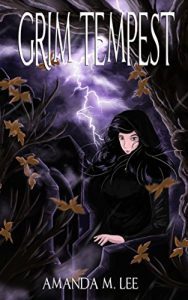 Grim Tempest by Amanda M. Lee:
Grim Tempest by Amanda M. Lee:
Life should be good for Aisling Grimlock. She’s engaged to a great guy, she’s getting the hang of being a reaper, and her rich father spoils her rotten on a regular basis. All that changes when a series of storms hit and the Michigan populace starts turning downright dangerous.
The streets are running with blood as people turn on one another for no good reason and the hospital is filling up with the sick and injured. That’s on top of the ones who are dying in terrible fashion … and leaving nothing but angst in their wake.
Right from the beginning, Aisling is convinced the storms are magical in origin. Of course, because she’s prone to theatrical fits, no one believes her … until the storms hit a little too close to home and Aisling herself is in danger from the one person she trusts above all others.
As a cop, Griffin Davenport is used to putting his life on the line. What he’s not comfortable with is being a threat to the people he’s supposed to be helping. The storms, you see, don’t affect reapers but those they love are in a heap of danger.
Aisling is determined to find the source of the storms, even if it leads to someone in her own family. She’s willing to claw, scratch and fight until the danger is eliminated. She’s also willing to whine, cajole and beg if it means she gets her way.
A big fight is coming, and it will be under a cloudy sky. Will the Grimlocks live to reap another day or have they finally found an enemy that’s big enough to take them out?
A new ship. A young crew.
A dream job gone horribly wrong.
When circumstances drive Zoya and Natalya to accept an offer from the most powerful organization in the Western Annex, it looks like their ship – literally – comes in. The job fails to live up to its promise and the pair soon find themselves fighting for their lives against a booby trapped ship and its unseen master.
Will they unmask their enemies and survive their Suicide Run?
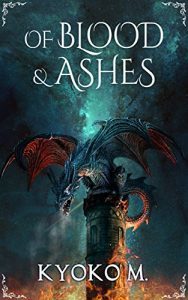 Of Blood and Ashes by Kyoko M.
Of Blood and Ashes by Kyoko M.
The world’s deadliest dragon, the infamous Baba Yaga, is loose on the streets of Tokyo.
Dr. Rhett “Jack” Jackson and Dr. Kamala Anjali have been tasked with helping the government take down a dragon the size of a Tyrannosaurus Rex after it sends part of the city up in flames. Things worsen when they lose track of dragon in none other than Aokigahara, the Suicide Forest–a section of woods in Japan that is rumored to be one of the most haunted places on earth. They’ve also got the yakuza who cloned the dragon hellbent on getting her back, and they don’t care who they kill in order to re-capture the dragon.
Jack and Kamala are joined by CIA field agent William Fry and dragon-hunting expert Juniper Snow as they infiltrate the forest to hunt the dragon before she can hurt anyone else. Between the ruthless yakuza hot on their trail and the growing mistrust in their small hunting party, it will take a miracle for Jack and Kamala to make it out alive…
Of Blood and Ashes is the second book in the series, following the Amazon bestselling Of Cinder and Bone.
Is it love, or is it alien abduction?
A young human, Antaska, encounters love and its dark side while traveling in outer space with her psychic cat and a giant alien. Mischievous but evil part-reptile humanoids team up with Antaska’s nemesis, a genetically enhanced fitness instructor, to take revenge on her to the ends of the universe. But her unexpected kidnapping spoils their plans.
Relationships can be complicated, especially between different species. A fast-paced dark comedy set one million years in the future.
Alien Pets, formerly Pets and Masters in Space, is the prequel to this book.
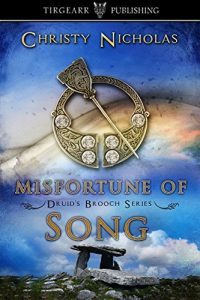 Misfortune of Song by Christy Nicholas:
Misfortune of Song by Christy Nicholas:
~ Even a soldier cannot fight love ~
In 12th century Ireland, all Maelan wants is to do his duty to his Chief and maintain his family’s good name. However, his granddaughter Orlagh, is hell bent on wreaking havoc, with no care for the consequences
When Orlagh falls in love with an itinerant bard, Maelan must rule with an iron fist to keep her from running away. However, her rebellion against his strictures results in disaster and he almost loses her in the same way he lost his beloved wife.
Maelan must make some difficult decisions and bargains with the Fae to save his granddaughter’s life and future. Can he save her happiness as well?
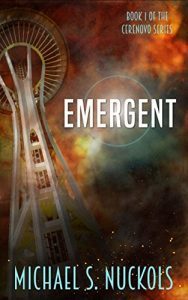 Emergent by Michael S. Nuckols
Emergent by Michael S. Nuckols
An emergent artificial intelligence immobilizes the world’s computers on the same day that a genetically-modified influenza virus begins killing millions. Is it war? Or something worse?
At his new job with a Seattle biotech company, Ridley Pierce refuses to use artificial intelligence to code software for synthetic organs. Fuzzy calculations,sweeping assumptions, and infinite loops can kill. What Ridley doesn’t know is that an AI is already in control and his parents are among its first victims.
Can Ridley rescue the digital world before society collapses? Or, has the Information Age already been lost to history?
 The Lunar Deception by T.E. Olivant:
The Lunar Deception by T.E. Olivant:
Alya has anxiety issues. Well, so do a lot of people. But not everyone explodes their enemies when they lose control.
Alya is a Geep, a mutant. Her genes were contaminated by an accident on the moon. This gives her extraordinary powers, but it also makes her a threat.
Determined to discover the secret of the contamination, Alya takes a position in the Lunar University. Unfortunately, the Continuum controls the moon, and it doesn’t like Geeps. There’s nothing the organisation would like better than to wipe out Alya’s people completely. But Alya is not about to let that happen.
To save them, she’ll risk everything.
The last time Dr. Meghan Forester saw Davin and the other infected Kazzies, she made a heart-wrenching choice. Now, her new life is filled with loneliness.
Trying to carry on while Davin and her friends are held captive on Reservation 1, Meghan begins a daunting position at Compounds 10 and 11 in Washington state. There, she is thrust into a challenging new world with a handsome assistant as her guide.
But Meghan refuses to abandon her friends, so when reports surface of atrocities being committed within Reservation 1, she returns to South Dakota and discovers the only way to save Davin and her friends is to face her old enemy. An enemy who will stop at nothing to keep the Kazzies contained, even if that means taking a life.
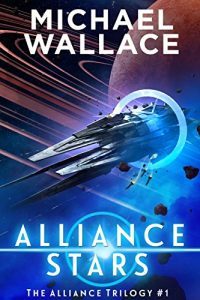 Alliance Stars by Michael Wallace:
Alliance Stars by Michael Wallace:
Captain Jess Tolvern of HMS Blackbeard is leading a Royal Navy expedition across long-dormant space lanes toward Old Earth when an alien fleet ambushes her battle cruiser. The aliens are Adjudicators, an ancient race whose ethos is to judge other species and reduce their survivors to a stone age existence.
Tolvern sends a desperate message back to headquarters and retreats with her damaged ship to friendly systems. By the time she returns, the aliens have already invaded Alliance territory with a powerful fleet of star fortresses and accompanying dragoon ships, trapping and laying siege to the allied fleet.
While repairing her ship, Tolvern cobbles together a squadron of damaged allied warships, former raiders, and the local survivors of an Adjudicator attack to drive off the alien fleet.
 Send to Kindle
Send to Kindle
April 28, 2018
Indie Crime Fiction of the Month for April 2018
 Welcome to the latest edition of “Indie Crime Fiction of the Month”.
Welcome to the latest edition of “Indie Crime Fiction of the Month”.
So what is “Indie Crime Fiction of the Month”? It’s a round-up of speculative fiction by indie authors newly published this month, though some March books I missed the last time around snuck in as well. The books are arranged in alphabetical order by author. So far, most links only go to Amazon.com, though I may add other retailers for future editions.
Our new releases cover the broad spectrum of crime fiction. We have cozy mysteries, international mysteries, British mysteries, YA mysteries, paranormal mysteries, science fiction mysteries, steampunk mysteries, crime thrillers, psychological thrillers, legal thrillers, romantic suspense, spy fiction, lawyers, spies, traitors, gunrunners, stalkers, serial killers, school shooters, grim reapers, the Greek mafia, innocents in prison, foiled weddings, murder on theatre stages, aboard airships and in outer space, spy action in the Middle East, crime in Las Vegas, Chicago, Alaska and Greece and much more.
Don’t forget that Indie Crime Fiction of the Month is also crossposted to the Indie Crime Scene, a group blog which features new release spotlights, guest posts, interviews and link round-ups regarding all things crime fiction several times per week.
As always, I know the authors at least vaguely, but I haven’t read all of the books, so Caveat emptor.
And now on to the books without further ado:
 Murder on the Titania and Other Steam-Powered Adventures by Alex Acks:
Murder on the Titania and Other Steam-Powered Adventures by Alex Acks:
Captain Marta Ramos, the most notorious pirate in the Duchy of Denver, has her hands full between fascinating murder mysteries, the delectable and devious Delilah Nimowitz, Colonel Geoffrey Douglas (the Duke of Denver’s new head of security), a spot of airship engineering and her usual activities: piracy, banditry and burglary. Not to mention the horror of high society tea parties. In contrast, Simms, her second in command, longs only for a quiet life, filled with tasty sausages and fewer explosions. Or does he? Join Captain Ramos, Simms and their crew as they negotiate the perils of air, land and drawing room in a series of fast-paced adventures in a North America that never was.
Murder on the Titania and Other Steam-Powered Adventures includes 4 novellas and a short story about piracy, banditry, burglary, jail-breaking, several brilliant bits of detective work and all manner of otherwise lawless hijinks performed by the valiant Captain Ramos and her crew.
Murder on the Titania: Colonel Geoffrey Douglas, the Duke of Denver’s new head of security, is drawn into a high society murder mystery on the Airship Titania. None of the passengers are quite what they seem, including the mysterious young woman who always turns up where she is least expected.
The Curious Case of Clementine Nimowitz (and Her Exceedingly Tiny Dog):
A simple burglary goes horribly awry when Captain Ramos and Simms stumble across a dead body, a small dog and the deceased’s heirs, the noisome Morris and the rather too interesting Delilah.
The Jade Tiger: a mysterious woman enlists Captain Ramos’s aid in getting her revenge on her former employer and Captain Ramos finds herself doing an unintentional good deed.
The Ugly Tin Orrery: Captain Ramos and her crew embark on what appears to be a perfectly ordinary train robbery, only to be drawn into the Duke of Denver’s political machinations via a strange metal artifact. Throw in a spot of jail breaking and an encounter with the lovely Delilah, and it’s all in a day’s work for Captain Ramos and Simms.
The Flying Turk: The Airship Titania is entering a new era and welcoming its first automaton pilot. Or, perhaps not. Captain Ramos and Simms are back aboard the Titania for a heady mix of murder, robbery, peeved scientists and oblivious peers, with a spot of engineering thrown in.
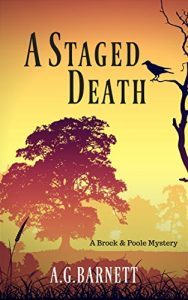 A Staged Death by A.G. Barnett
A Staged Death by A.G. Barnett
When showbiz gets ugly…
The world of showbiz comes to Bexford when the new series of hit TV show Foul Murder is launched there. Soon, life imitates art as a murder is committed, live on stage.
Luckily, Detective Sergeant Guy Poole and Detective Inspector Sam Brock are in the audience to take charge of the scene.
When it becomes clear that one of their own is the prime suspect, they are determined to help prove his innocence, no matter how annoying he is.
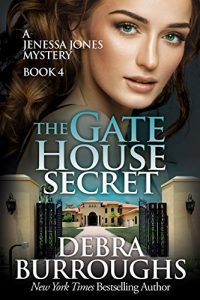 The Gate House Secret by Debra Burroughs:
The Gate House Secret by Debra Burroughs:
Reporter Jenessa Jones’ wedding is right around the corner…until her nemesis Grey Alexander digs up an explosive, long-buried secret and threatens to expose it unless she calls off the wedding.
Feisty Jenessa is determined to fight to keep her skeletons buried, but soon she is rocked to the core when a scandalous murder puts her entire future in jeopardy…not to mention her life. Can she uncover the killer, hold on to her fiancé, and make it to the altar alive?
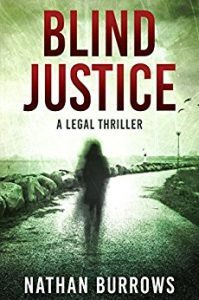 Blind Justice by Nathan Burrows:
Blind Justice by Nathan Burrows:
Gareth Dawson is an innocent man. Not a murderer. His main problem is that the British justice system doesn’t agree with him.
He might be a reformed thief guilty of many things in his past, but not murder. In the space of a few short months, he’s gone from being married to the woman of his dreams to facing a life sentence.
Inside Her Majesty’s Prison Whitemoor, a Category A prison in Cambridgeshire, Gareth’s got all the time in the world to go over the events that led to the guilty verdict. The guilty verdict which cost him everything in the world that he loved. His dignity. His freedom. His wife.
Gareth is approached by a lawyer, Paul Dewar, who claims to have information that will vindicate Gareth. But is it enough to set him free? As threats against Gareth increase on the inside, Paul Dewar’s challenge, and Gareth’s fight for freedom, begins.
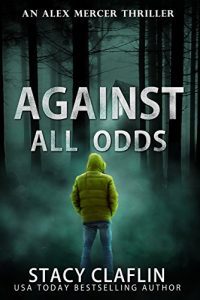 Against All Odds by Stacy Claflin:
Against All Odds by Stacy Claflin:
Betrayals. Secrets. Tragedy.
It started as a day like any other for Alex Mercer. Then he heard the news. Something that only happens in other places is happening in his hometown.
Just a few miles away at his daughter’s middle school, a shooter is on the loose. Alex does what every other parent in town does—he races to the school to find out if his loved ones are safe.
His world falls apart around him, and he can’t turn to his best friend because they’re both dealing with scathing terror.
As the motive behind the shooting comes to light, secrets and betrayals spiral out of control.
Will Alex give into old temptations in the face of the current situation, or will he be able to move past everything and help those he loves the most?
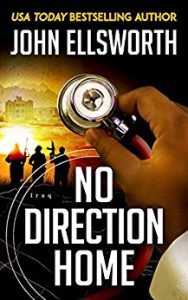 No Direction Home by John Ellsworth:
No Direction Home by John Ellsworth:
Michael Gresham is the lawyer you’d want to call about a crime. Especially if you were guilty…
Visana, proudly packing away her brand new medical license, leaves for Iraq. She has accepted a medical mission to the Kurds. After landing in Baghdad, her driver heads north toward Kirkuk. For six straight months, Visana treats maimed and burned children who wandered into the path of the war. Saddam Hussein’s soldiers are now in charge. And they are looking for her. Baghdad knows she’s there, knows she’s a doctor, and wants to use her in the war to treat Saddam Hussein’s soldiers. Or so they say.
But once she’s in their grasp, her whole world turns upside-down. Hussein uses her to commit crimes more horrible that any she’d ever imagined. Meanwhile, outside the walls of the clinic, the war rages. After six months of back-and-forth fighting, the American Army gains control of Kirkuk. Visana is released from the horror of her captivity. But she is a broken woman with no idea how to fix herself. Using every resource she can muster, she is on a jet bound for Chicago by the next evening. Home has never looked better: a place to rest and weep and start to heal.
Instead, one afternoon as she’s walking along Michigan Avenue, she is arrested. The U.S. Army is charging her with war crimes. If she’s convicted she will be put to death–the Army prosecutors make that very clear. There can be no forgiveness.
Her family knows nothing about lawyers in Chicago, especially criminal lawyers. But then, “Several years ago,” her grandfather tells her, “there was a lawyer here who never lost. His name was Gresham.”
Michael Gresham gets the call. Visana has tracked him down. She tells him her story. He has never heard of such horror before, but he agrees to help.
And why not? He believes she’s actually innocent.
As innocent as they ever are.
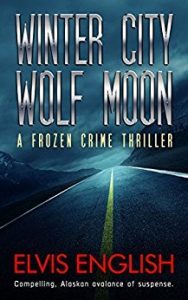 Winter City Wolf Moon by Elvis English:
Winter City Wolf Moon by Elvis English:
When the bodies of two young Alaska Native women are discovered along the banks of Ship Creek, and their deaths are ruled “accidental” and “undetermined” by police, burned out gumshoe Lewis Bocarde, well-acquainted with life on the gritty streets of Anchorage, senses something sinister rising. Allied with a suicidal social worker named Grace and a street-savvy group of indigenous contrarians, Bocarde races to discover what flocks of ravens already know.
And to thaw the frantic screams frozen in the snow.
 Harriet Walsh: Peace Force by Simon Haynes:
Harriet Walsh: Peace Force by Simon Haynes:
Harriet Walsh is desperate for work, but when an intergalactic crime-fighting organisation offers her a job she’s convinced it’s a mistake. She dislikes puzzles, has never read a detective mystery, and hates wearing uniforms. So why did the Peace Force pick her?
Who cares? Harriet needs the money, and she’s happy to go along with the training for as long as they keep paying her. She’d better dig out some of those detective mysteries though, because she’s about to embark on her first real mission…
A hero, sent out as a mark. Who’s behind the betrayal?
Spies on the hunt.
A traitor in their midst.
Suspicions are high and time is short.
Who is behind the betrayal?
Spy Master Javin wants to eliminate two terrorist masterminds, but he’s not the only one looking for them. When the mission suspiciously goes awry, his team is now forced into a dubious alliance with Mossad and the infamous Iranian Islamic Revolutionary Guard.
Pursuing the terrorists deep into hostile Saudi Arabia, they not only discover an assassination plot that could topple the Saudi kingdom, but also suspect a traitor has infiltrated their team. Who is behind this betrayal? With suspicions high and time short, can Javin and Claudia unmask the traitor and stop the assassination plot before the Middle East is plunged into an all-out war?
Have Greek car, will travel?
The bad news:
Kat Makris’ car just went up in flames.
The good news:
Kat has a new …
Well, it’s not technically a car, but it could be if she squints and ignores the braying.
Kat is going nowhere fast on her new mode of transport, but the world is changing shape around her. Dad is thinking of selling her childhood home; the devastatingly sexy Detective Nikos Melas is no longer speaking to her; and scrumptious Xander, double agent, has been keeping his distance.
The ground under her feet lurches sideways again when the Godfather of the Night himself, Baby Dimitri, rocks up to the family compound, begging for sanctuary. An old enemy has clawed his way out of the grave. He wants Baby Dimitri dead. He wants Grandma dead. Basically he wants everyone dead. And he wants them to do their dying to the beat of a 1980s soundtrack.
With a funeral to orchestrate, a long-neglected filing cabinet to sort through, and a KGB agent’s familiar flunkies following her every move, Kat doesn’t want to get involved.
Until Grandma’s kidnapping leaves her with no other choice.
 Grim Tempest by Amanda M. Lee:
Grim Tempest by Amanda M. Lee:
Life should be good for Aisling Grimlock. She’s engaged to a great guy, she’s getting the hang of being a reaper, and her rich father spoils her rotten on a regular basis. All that changes when a series of storms hit and the Michigan populace starts turning downright dangerous.
The streets are running with blood as people turn on one another for no good reason and the hospital is filling up with the sick and injured. That’s on top of the ones who are dying in terrible fashion … and leaving nothing but angst in their wake.
Right from the beginning, Aisling is convinced the storms are magical in origin. Of course, because she’s prone to theatrical fits, no one believes her … until the storms hit a little too close to home and Aisling herself is in danger from the one person she trusts above all others.
As a cop, Griffin Davenport is used to putting his life on the line. What he’s not comfortable with is being a threat to the people he’s supposed to be helping. The storms, you see, don’t affect reapers but those they love are in a heap of danger.
Aisling is determined to find the source of the storms, even if it leads to someone in her own family. She’s willing to claw, scratch and fight until the danger is eliminated. She’s also willing to whine, cajole and beg if it means she gets her way.
A big fight is coming, and it will be under a cloudy sky. Will the Grimlocks live to reap another day or have they finally found an enemy that’s big enough to take them out?
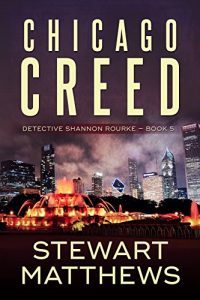 Chicago Creed by Stuart Matthews:
Chicago Creed by Stuart Matthews:
She took an oath to uphold the law, but oaths can be broken.
Chicago PD Detective Shannon Rourke is falling apart, but by now, she’s used to it.
Her misfortune, however, has infected the people she loves. Her boyfriend worries she’s concealing a dark secret, and his daughter is tormented by memories of a deranged serial killer–who targeted the girl because of Shannon.
She needs a break from work before she snaps, but her problems have to wait when she’s called to a puzzling crime scene on Chicago’s deadly West Side. With a killer dropping fresh corpses every day, she fights to keep her demons shackled while she goes on the hunt. A single misstep could turn her misfortune into deadly tragedy–not only for herself, but for the family she loves.
 The Dead Woman by Jennifer Samson:
The Dead Woman by Jennifer Samson:
Secrets can kill …
Tim Kelly makes a deal with Mexican gunrunners that will bring him much-needed cash and improve his standing in Vegas’ criminal underworld. Then he gets stiffed, and the only person with an explanation isn’t talking.
Lupe Delgado is on the run from a powerful cartel and her only goal is to put distance between her and the man who wants her dead. Her escape is thwarted when she ends up in Tim’s hands.
Tim offers an exchange: information on the location of his weapons shipment for Lupe’s freedom. Lupe reluctantly agrees to help Tim, but refuses to tell him why she fled Mexico.
When hitmen arrive in town, Tim and Lupe take the fight to Mexico. Surrounded by enemies, Lupe must reveal her secret if they’re going to survive – and it’s one the cartel will kill to keep.
 Because… Anonymous by Diana L. Sharples:
Because… Anonymous by Diana L. Sharples:
It’s tough to be a good guy … when everyone thinks you’re a stalker.
On the run from an abusive father, Noah Dickerson is supposed to be lying low and staying out of trouble.
Mistake #1, falling in with a group of anime fans who aren’t as harmless as they seem.
Mistake #2, crushing on a beautiful girl who isn’t fooled by Noah’s good looks and charm.
Mistake #3, being in the wrong place when she receives threatening notes in her locker.
But the biggest mistake, Noah learns, was when his mother escaped North Carolina with him. Because, it turns out, transporting a minor over state lines in the middle of the night is a felony.
 Secrets and Lies by Rachel Sinclair:
Secrets and Lies by Rachel Sinclair:
A young billionaire, Silas Porter, is accused of murdering his socialite wife, Ava.
Damien takes the case, not knowing the real reason why Silas, CEO of Porter Enterprises, an international tech firm, is so determined that he represent him. Him, and only him.
As Damien digs deeper into the case, he realizes that nothing and nobody are as they seem. After finding out Silas’ deep, dark secrets, Damien attempts to withdraw from the case. But there’s no way that he’s going to let him drop his case so easily.
By the time the trial rolls around, Damien doesn’t know if he’s coming or going with his client. Then a surprise witness emerges that tosses everything on its head.
With a surprise twist that you’ll never see coming, and the twists and turns that you’ve come to expect from a Damien Harrington Legal Thriller, Secrets and Lies is not to be missed!!!
 Send to Kindle
Send to Kindle
April 27, 2018
Open Thread for File 770 Refugees
File 770 is having ISP problems, so if the site goes down again, here is an open thread/substitute gathering place for File 770 refugees.
The comment setting is so that every poster must have a previously approved comment. I’m not always at the computer, so be patient if I don’t get to your comment right away.
 Send to Kindle
Send to Kindle
April 5, 2018
Some Reactions to the 2018 Hugo Award Finalists
For my own take on the 2018 Hugo Award finalists as well as the 1943 Retro Hugo Awards finalists, go here. Meanwhile, reactions from around the Internet are trickling in, though the debate seems rather muted this year, compared to the last five years (yes, there were intense debates about the merits of the Hugo finalists even before the puppy years). Mostly, people are just happy that we have a very good Hugo ballot that is entirely free of puppy poo.
This is more or less the tenor of Joe Sherry’s post about the 2018 Hugo finalists at the Hugo-nominated fanzine nerds of a feather. He’s really happy about the overall high quality of the finalists as well as happy about the nominations for nerds of a feather as well as for fellow nerds of a feather contributor Charles Payseur in the best fanwriter category.
At Dreaming About Other Worlds, Aaron Pound also shares his thoughts on the 2018 Hugo finalists and is happy to have a strong and puppy-free ballot. He also weighs in about the new YA Award and the insistence on stressing that it is “not a Hugo Award”, even though to most fans and voters there won’t be much of a difference.
In his post at Patreon, Aidan Moher is also pleased with the overally high quality of the 2018 Hugo ballot with some reservations. One is that Aidan Moher is not happy with the best fanzine nomination for Rocket Stack Rank following some controversies in the past year and wishes Quick Sip Reviews had been nominated instead. Never mind that Charles Payseur of Quick Sip Reviews has been nominated for best fanwriter, so it’s not as if he’s been forgotten. Not to mention that there is room for more than one (or even more than two, for that matter) SFF short fiction review sites. Besides, even though the approach of Rocket Stack Rank and Quick Sip Reviews to reviewing short fiction is very different, both do good work and both are valuable resources that complement each other well. And coincidentally, I disagree with both of their reviews much of the time, because tastes differ. That’s precisely why it’s important to have more short fiction review sites.
Another issue that Aidan Moher raises is that of repeat nominees, i.e. that the same names keep showing up on the Hugo shortlist year after year after year. Now repeat nominees are definitely is an issue, though it’s far from a new phenomenon, but instead one we’ve been seeing for more than thirty years now. Mike Resnick got at least one nomination per year for twenty years or more. Michael Whelan practically owned the best pro artist category in the 1980s and early 1990s. Hell, best fanwriter was a two person race between David Langford and Mike Glyer for approx. twenty years. I also think everybody can name one or two finalists (not necessarily the same finalists) in any given year that you personally suspect were nominated more because their fanbase will nominate anything they produce and less on the strength of this particular work. For example, I was a bit surprised that The Collapsing Empire by John Scalzi made the ballot, for while the book is perfectly fine and enjoyable, I don’t find it particularly outstanding. There are more interesting and innovative space operas out there, but Scalzi is popular with the Hugo electorate. And while I like a lot of Seanan McGuire’s work, I have to admit that the Wayward Children series just doesn’t do it for me like it evidently does for others. And then of course, there is the annual nomination for whatever Doctor Who episode is eligible that year. Though the Doctor Who dominance has receded compared to previous years (there was one year where the best dramatic presentation ballot consisted of four Doctor Who episodes and one episode of something else, which I disliked, so I wound up ranking four episodes of a show I had already given up on) and it’s been a while since the good Doctor has been able to win the category. Just as we regularly see new names and also a churn of established names in categories like best fan writer, best fan artist, best pro artist, best semiprozine and best fanzine, which used to be dominated by the same names year after year after year.
And besides, many people continue to do good work year after year. Should we not nominate them, because they’ve been nominated before, if we honestly think they are the best choice for the category in question? There are names I nominate year after year as well, because I simply like their work a whole lot and because I honestly think they are among the five best in the respective category. Though I also have to admit that when I have a choice between someone who has had plenty of Hugo nominations before and someone who has never been nominated, I tend to go with the new voice, all else being equal.
Talking of new voices, at the Singapore Straits Times, Toh Wen Li celebrates the two Singaporean Hugo finalists, J.Y. Yang and Vina Jie-Min Prasad, who has a great Cyberpunk story in Uncanny this month. The Straits Times also has a nice double review of J.Y. Yang’s Hugo nominated novella The Black Tides of Heaven and its sister novella The Red Threads of Fortune.
The Indian site Scroll.in celebrates the two Indian Hugo finalists, Mimi Mondal, who is nominated in the best related work category, and Gautam Bhatia, who’s on the staff of Strange Horizons.
Meanwhile, the Australian publishing news site Books + Publishing focusses on the various Australians nominated for the Hugo Awards this year. Initially they forgot Camestros Felapton and best fan artist nominee Mia Serreno a.k.a. Likhain, but they’ve been added in a corrected version of the article.
At the Washington Post, Michael Cavna focusses on the best graphic story category and profiles Emil Ferris, artist/author of My Favourite Thing Is Monsters, ironically the lone nominee on the best graphic story shortlist I am entirely unfamiliar with. Turns out that Emil Ferris is female in spite of the name.
Meanwhile, over at the puppy camp, there is resounding silence regarding the 2018 Hugo finalists. I checked out a lot of puppy blogs, but there’s nothing. It seems that the puppies have all moved on to the Dragon Awards or the Conservative Libertarian Fiction Alliance Book of the Year Award (for which you can vote here) or the Planetary Awards. They are also happily proclaiming the impending pulp revolution. This is a good thing, because it means that the movement formerly known as sad and rabid puppies is finally doing something constructive and building up their own structures rather than trying to hijack and take over someone else’s. Plus, this is the first year of Hugo voting where I finally have a ballot completely free of puppy poo to vote on. Yes, there are still nominees I’ll probably no award, but that’s because I dislike these works that many other people evidently like, not because the puppies or anybody else for that matter cheated them onto the ballot.
Though Camestros Felapton, most worthy nominee in the best fan writer category, did uncover some puppy activity after all on Facebook, where I don’t have a account and therefore cannot see it. Because it seems that Larry Correia – the man who started it all, when he lost the Campbell Award to Lev Grossman back in 2011 and couldn’t come to terms with the fact that the Hugo electorate liked another writer more than him – is bitching on Facebook that the 2018 Hugo shortlist is an April’s Fool joke, because it is full of Tor books, women, writers of colour and people and works puppies don’t like, that people are nominating works based on the author’s gender, race or sexual orientation and not because they actually like them and that the Hugos are only good for academics trying to get tenure anyway. Oh yes, and the Hugos, WorldCon and Tor are doomed. In short, it’s more or less the same stuff we’ve heard from that crowd before. Camestros had some highlights here, while Larry Correia’s original post and the comments may be found here.
As usual, the puppy arguments are easy to debunk. As for Tor’s supposed dominance, as pointed out in my original Hugo post, Tor or more precisely Tor.com Publishing only dominates in the novella category for obvious reasons, because Tor.com Publishing’s novella line is the biggest market for novellas around. Some magazines do accept novellas and indeed Uncanny could get one nominated, and of course, writers can always self-publish them. However, magazine and self-published novellas are competing both with Tor.com Publishing’s marketing dollars as well as with the very high quality of their novella line. If you’re an indie, you really have to be someone of the calibre of Lois McMaster Bujold to even get noticed.
Meanwhile, Orbit actually dominates the best novel category, but then a few pups have noticed by now that Orbit a) exists and b) that they hate it, too, which is progress, I guess. Meanwhile, the short fiction categories are a mixed bag with Uncanny winning six nominations (plus best editor and best semiprozine), Tor.com and Clarkesworld winning two each and Beneath Ceaseless Skies, Apex and Asimov’s winning one each. But then, the puppies have decided that they hate Uncanny, too. Best series is another mixed bag with two nominations for Tor, and one each for DAW, Broadway Books, Nightshade and Harper Voyager. The YA Not-a-Hugo Award is yet another mixed bag with one nomination each for Viking Press (owned by Penguin Random House Bertelsmann), Harper Teen, Alfred J. Knopf (also owned by Penguin Random House Bertelsmann), Big Mouth House (operated by Small Beer Press), Henry N. Abrams Books (operated by Hachette) and a small press/self-published book. So in short, the alleged dominance of Tor/Macmillan/Holtzbrinck is very much a fiction outside the novella category.
As for the “But what about the poor white menz?” complaints, I already addressed this point here one and a half year ago. The short version is, it took fifteen years for the first woman writer to win a Hugo in a fiction category and seventeen years for the first writers of colour to win a Hugo in a fiction category. A few years in a row of Hugo shortlists and winners that are majority female don’t change this balance. Maybe, after fifteen years of only women winning Hugos, the men can start whining.
Besides, there are men, some of them even straight and white, on the 2018 Hugo shortlist. Looking at the fiction categories alone, there are John Scalzi, Kim Stanley Robinson, Yoon Ha Lee, K.M. Szpara, Robert Jackson Bennett, Brandon Sanderson, Sam J. Miller and Philip Pullman. All of them are male and all but one are white. However, the problem of our canine friends is not so much that there are no male Hugo finalists, but that the wrong men got nominated. The puppies’ IMO inexplicable hatred for John Scalzi is well documented, Yoon Ha Lee, K.M. Szpara and Sam J. Miller are all LGBT writers, Kim Stanley Robinson is an environmentalist, Philip Pullman is known to be highly critical of organised religion. Okay, so I have no idea what their objection to Robert Jackson Bennett and Brandon Sanderson could be, especially since Sanderson’s bestselling fantasy series should be right up their alley.
As for the puppies’ insistence that people nominate and vote for women, writers of colour and LGBT writers as a form of virtue signalling and not because they genuinely like those works, Hugo voters across the board have repeatedly been saying that they nominated and voted for the works they liked. I certainly have been nominating only works I like and my Hugo ballot has been full of women, writers of colour and LGBT writers these past four years. However, I have also nominated Tim Powers, a white conservative Catholic man, because I love his fiction. However, as has been amply demonstrated, the puppies have problems accepting that tastes differ and that other people might genuinely love works that they dislike. Hell, there are works on the Hugo shortlist that I don’t particularly care for or outright dislike, but enough people apparently felt differently and so those works made the shortlist.
As for the claim, that authors are using Hugo nominations and wins to persuade universities to hire them for teaching positions and/or give them tenure, as was extensively discussed in the comments at Camestros’ post, university hiring committees usually don’t care about the genre fiction or the Hugo Awards and may not even know what the Hugos are. A literary award might help an author to nab a university job, a genre award won’t. Besides, there only is a single author on the 2018 Hugo shortlist who is a university professor in a field related to writing and literature, namely Nnedi Okorafor. All other authors on the shortlist don’t work in academia and aren’t currently applying for any teaching positions.
Meanwhile Jon Del Arroz’s Happy Frogs site has put out its Hugo voting recommendations. It’s obvious that his picks aren’t even remotely serious, since he intensely dislikes many of the people he recommends, but then recommending works and people you hate for Hugo Awards is a thing among the remnants of the puppy movement – Vox Day did it last year as well and recommended N.K. Jemisin. Apparently they think that if people they hate win Hugos, it will devalue the award or something. And no, I don’t get it either. And just in case there was any doubt regarding the Happy Frogs slate, Jon Del Arroz has also posted a video in which he shares his thoughts on the 2018 Hugo finalists. That is, he mostly mocks the Hugo finalists’ names, complains that there are too many women and that he hasn’t heard of most nominees and generally displays his complete and utter ignorance of pretty much everything. He also feels offended and persecuted by commenters at File 770 yet again. Nonetheless, his Hugo picks are actually pretty good, but then we do have a really good ballot this year, so even if you picked your first choice at random, you have a high chance of hitting something good.
Comments are closed – puppies and frogs whine elsewhere.
 Send to Kindle
Send to Kindle
April 3, 2018
A Triple New Release and Some Thoughts on Cozy Space Opera
Now that the excitement caused by the triple whammy of Easter, Passover and the announcement of the 2018 Hugo Finalists has died down somewhat, I have an announcement of my own to make. And it’s a big announcement, because I have not one but three new In Love and War stories to announce, two short stories and one short novel.
The first of the two short stories isn’t quite that new, because it has been available as part of the anthology The Guardian for a while now. However, if you want a standalone edition, here is your chance.
Like Dreaming of the Stars and Graveyard Shift, Baptism of Fire is a prequel to the In Love and War series proper, though it is listed as Part 2 at most vendors, because they don’t support prequels very well.
With Baptism of Fire, there now are three prequel stories to the In Love and War series, because I like showing who Anjali and Mikhail were before they became the people they are today. In Dreaming of the Stars, we meet them both as teenagers and learn what drove them both to join their respective militaries. The next two stories focus on their respective military careers. We’ve already briefly seen Mikhail as an operative of the Republican Special Commando Forces in Graveyard Shift, though he’s only a supporting character in that story. In Baptism of Fire, we now see Anjali as a young cadet with the Shakyri Corps.
If you’ve read some or all of the In Love and War stories, you know that it isn’t exactly a conventional space opera series, let alone conventional military SF. In Love and War is basically the story of two people who decide to run away from the typical space opera/military SF plot, in this case an endless intergalactic intergalactic war. Only that the plot keeps coming after them, trying to drag them back. In fact, as mentioned here, the In Love and War series was born out of frustration, because after the third or fourth time of running into a science fiction plot featuring a couple that couldn’t be together because of reasons, I got very sick of the whole thing and wished they’d just run away together to become space pirates or intergalactic outlaws or open a restaurant on a far away planet or something. However, space opera and military SF characters don’t normally run away from the plot, no matter how logical that would be, so I had to write that story myself.
However, while the In Love and War series isn’t conventional space opera or military SF, Baptism of Fire is as close as it probably comes to that. After all, the story was deliberately written to attract new readers to the In Love and War series, many of whom may well prefer a more traditional adventure in space. And so the story follows Anjali as a seventeen-year-old cadet on her very first mission with the Shakyri Corps, where things go of course disastrously wrong. We also meet Anjali’s commanding officer Captain Vikram as well as fellow recruit and later Anjali’s good friend (and he’s really just that, no matter how much Mikhail might suspect otherwise), Anil Golkhari. Both characters will probably appear again in future In Love and War stories.
Baptism of Fire
[image error]Cadet Anjali Patel had hoped for something more exciting than guard duty for her first mission with the legendary Shakyri Expeditionary Corps, the best fighters in the Empire of Worlds.
However, this boring job quickly turns hot, when an enemy convoy comes up the mountain pass Anjali is supposed to guard.
This is a prequel story of 4500 words or approx. 18 print pages to the “In Love and War” series, but may be read as a standalone.
More information.
Length: 4500 words
List price: 0.99 USD, EUR or GBP
Buy it at Amazon US, Amazon UK, Amazon Germany, Amazon France, Amazon Netherlands, Amazon Spain, Amazon Italy, Amazon Canada, Amazon Australia, Amazon Brazil, Amazon Japan, Amazon India, Amazon Mexico, Kobo, Barnes & Noble, Apple iTunes, Google Play, Scribd, Smashwords, Inktera, Playster, Thalia, Weltbild, Hugendubel, Buecher.de, DriveThruFiction, Casa del Libro, e-Sentral, 24symbols and XinXii.
While Dreaming of the Stars, Baptism of Fire and Graveyard Shift are all prequels of sorts, Freedom’s Horizon is (to date) the first book proper in the In Love and War series. Coincidentally, it’s also the longest at 55000 words, which makes it a novel, albeit a short one, by SFWA standards.
Though Freedom’s Horizon is the true beginning of the In Love and War series in more ways than one, because it was – at least in part – the first In Love and War story I ever wrote. For approximately two years ago, a scene popped into my head: Two intergalactic mercenaries, a man and a woman were bantering while walking through a grimy spaceport. I knew at once that they were a couple and that they came from very different backgrounds which they had left behind to be together. They worked as mercenaries now, not because they wanted to, but because it was the only option left open to them. They were also on the run and about to apply for a security position aboard a freighter, because the ground had gotten too hot for them. This early scene became, in slightly altered form, the second chapter of Freedom’s Horizon.
I was intrigued by the bantering couple, so I started writing. As I followed them through the spaceport, I learned a lot more about them: Their names, that they had both been elite soldiers on opposite sides of an endless intergalactic war, that they had fallen in love and run away together. I also got, in bits and pieces, the story of how they’d met and fallen in love and what had prompted them to leave behind everything they’d ever known and run away together. Eventually, I went first back in time to the story of how they met and fell in love against all odds (which will eventually be published, though it is emotionally draining to write) – and then forward to other adventures set when Anjali and Mikhail were already an established couple. Because by Freedom’s Horizon, they haven’t been together long and are still trying to figure out how they feel about each other. That is, Anjali is trying to figure out how she feels about Mikhail and their relationship and the loss of her old life. Because Mikhail already knows very well how he feels about her.
After I’d published several stories of varying lengths in the In Love and War series, I went back to take another look at that very first story I wrote that I’d never finished and noticed that I had a solid story there that was approximately two thirds finished, even though it wasn’t the story I’d initially thought I was telling. Because originally, I had intended for the story that eventually became Freedom’s Horizon to be a kind of Firefly-esque space opera, chronicling the adventures of the crew of the Freedom’s Horizon, including new recruits Anjali and Mikhail, during their voyage through pirate-infested space. However, as I wrote the story, trouble found Anjali, Mikhail and the Freedom’s Horizon before they could even leave the orbit of Metra Litko. And the trouble that found them was a lot more exciting than any altercation with space pirates could ever be. I also realised that Anjali and Mikhail were the true focus of the story, while the crew of the Freedom’s Horizon, though interesting people, were secondary characters. Coincidentally, Elijah Tyrone, Captain of the Freedom’s Horizon, also appears in Graveyard Shift, where you learn more about his family and his background.
So is Freedom’s Horizon a typical space opera? Well, it has spaceships, shoot-outs, fight scenes, chase scenes, desperate last stands, a seedy spaceport bar named The Scuttling Cockroach, a big space battle and a dramatic stand-off in orbit – in short, lots of the good stuff. However, it also has romance, friendship, emotions, people talking about their feelings, characters bonding over vid dramas and food – in short, lots of the mushy stuff. It even includes a recipe, because there is so much talk about food, I thought that some readers might like to know how to make one of the dishes. And yes, I know that recipes in the backs of novels are a thing in the cozy mystery genre and occasionally pop up in romance as well, but they aren’t very common in science fiction, though Joyce Chng includes recipes in some of her novels.
Coincidentally, I also added a new author’s note to Graveyard Shift, where I talk a bit about the pastries that the members of the military tribunal eat, while plotting cover-ups and handing out death sentences. No recipes this time, because these aren’t my pastries, but those of one of my favourite bakeries. And yes, I tuckerized the bakery.
When I was getting Freedom’s Horizon ready for publication and writing a different In Love and War story, where food also plays a big role, at the same time, I thought, “Other writers put recipes into their cozy mysteries, but I put them into my space opera. I guess I’m writing cozy space opera here.”
And then I thought, “Actually, cozy space opera sounds pretty cool.”
Of course, I didn’t invent that term. A bit of googling revealed that the newly Hugo-nominated podcast Sword and Laser referred to Becky Chambers’ debut The Long Way to a Small Angry Planet as cozy space opera, which it absolutely is. Ditto for A Closed and Common Orbit, Becky Chambers’ second novel.
Also of interest in this context is Liz Bourke’s Tor.com article on domestic space opera from last year, in which she names Becky Chambers’ books as well as C.J. Cherryh’s Foreigner series and Aliette de Bodard’s Xuya Universe stories as examples.
Liz Bourke defines domestic space opera as follows:
Yet the operatic element—the intensity of emotion and of significance—still comes to the fore in all of these stories, for all the ways in which they take place in intimate settings and concern, often, small acts. It is this reaching for the high pitch of intensity, albeit in small and sometimes domestic contexts (and whether always successful or not), that makes them space opera, I think.
There is enough emotional scope within one single person’s life and relationships to cover any artist’s canvas in furious colour. And there’s something faintly radical about treating an individual in quieter settings as just as worthy and interesting a subject as the clash of empires…
Shaun Duke responds to Liz Bourke’s post with his own reflections on domestic space opera and points out that the personal is political, in space opera as in life. He also adds parts of Frank Herbert’s Dune, Ann Leckie’s Imperial Radch trilogy and her novel Provenance and the works of Joyce Chng as examples of domestic space opera.
Let’s have a quote from Shaun as well:
I’d like to add one thing more: the personal is fundamentally representative of the political, and the use of domestic spaces can reveal the influences of the political sphere on everyday life. How people live, what they do in their homes or among friends or family, etc. are all fed by the larger political systems in play, such that the traditional space opera tensions are echoed in the tensions within the domestic. Indeed, you might say that much of space opera — and its fans — has focused on the macro level, looking at the tensions produced by big sweeping motions of the writer’s brush; domesticity, however, focuses on the micro level, giving us a glimpse into how those much larger tensions actually impact individual relationships and behavior at home.
These definitions definitely fit the In Love and War series, where the eighty-eight year war between two galatic powers is reflected in the relationship between two people, who manage to fall in love with each other, even though their respective nations are at war and have been for longer than either of them have been alive. We also see the endless war and its consequences reflected in other characters such as Elijah Tyrone, Captain of the Freedom’s Horizon, and Colonel Brian Mayhew, Mikhail’s former mentor/surrogate father turned antagonist, who is probably the character who surprised me most, considering that I originally intended him to be just a simple villain.
The In Love and War series has quite a bit of action – after all, Mikhail and Anjali are elite soldiers turned mercenaries, and fighting is what they do. However, there are also plenty of quieter moments, plus love, friendship, family, characters bonding and of course, food.
But this is still a new release announcement, not a rumination about cozy space opera, so why don’t you give Freedom’s Horizon a try, cause it really has all of the good stuff – seedy spaceport bars, chases, shoot-outs, space battles, emotions, feelings, love, friendship, family – all that and recipes, too.
Freedom’s Horizon
[image error]Once, Anjali Patel and Mikhail Grikov were soldiers on opposing sides of an intergalactic war. They met, fell in love and decided to go on the run together.
Now Anjali and Mikhail are trying to eke out a living on the independent worlds of the galactic rim, while attempting to stay under the radar of those pursuing them.
After a run-in with a Republican spy on the rim world of Metra Litko, Anjali and Mikhail need to get off planet fast. So they sign on as security aboard the freighter Freedom’s Horizon, which is supposed to transport a valuable cargo through pirate infested space.
But they have far bigger problems than pirates, for the Republic of United Planets sends no less than three battlecruisers after them, commanded by none other than Colonel Brian Mayhew, Mikhail’s former superior and now their most determined pursuer.
The chase culminates in a stand-off in orbit around Metra Litko, where Anjali and Mikhail have to make a fatal choice. Fight and endanger the innocent crew of the Freedom’s Horizon or surrender and face death and worse at the hands of the Republic.
More information.
Length: 55000 words
List price: 3.99 USD, EUR or 2.99 GBP
Buy it at Amazon US, Amazon UK, Amazon Germany, Amazon France, Amazon Netherlands, Amazon Spain, Amazon Italy, Amazon Canada, Amazon Australia, Amazon Brazil, Amazon Japan, Amazon India, Amazon Mexico, Kobo, Barnes & Noble, Apple iTunes, Google Play, Scribd, Smashwords, Inktera, Playster, Thalia, Weltbild, Hugendubel, Buecher.de, , Casa del Libro, e-Sentral, 24symbols and XinXii.
The final new release for today is another In Love and War short story. I should maybe say something about the reading order for the In Love and War series now. In principle, all In Love and War stories can be read as standalones in any order, because they’re all self-contained. However, if you want an official reading order, start with Dreaming of the Stars (which is also the quiestest story of the series), then Baptism of Fire and Graveyard Shift, then Freedom’s Horizon, followed by Courting Trouble. Then Bullet Holes, Dead World and finally, the last new story for today, Double-Cross. This is also as good a moment as any to point you to the special In Love and War series bundle, where you can get all of the stories in the series to date at a drastically reduced price. Only at DriveThruFiction.
Double-Cross is another story to come out of the 2017 July short story challenge, where the goal was to write a story per day in July 2017. Baptism of Fire was another July short story challenge story, by the way.
Like many of the July short story challenge stories, Double-Cross was inspired by a piece of science fiction concept art, namely this lovely piece of Cyberpunk art. The image intrigued me, so I sent Anjali and Mikhail into that rain and neon-drenched environment on a retrieval mission. They successfully completed their mission and retrieved the McGuffin and I was stuck regarding what should happen next. So I looked through my folder of inspirational images again and came across this piece of Cyberpunky concept art, which sort of matched the first image. And suddenly I knew what would happen next.
While we’re on the topic of art, I’d also like to add a shout-out to the wonderful artist Tithi Luadthong a.k.a. Grandfailure, whose striking artwork graces all of the In Love and War covers so far.
Like all of the In Love and War stories, Double-Cross has plenty of banter between Anjali and Mikhail. It also has nanotech, noodles, space ninjas and a double-crossing client.
So go and check out…
Double-Cross
[image error]Once, Anjali Patel and Mikhail Grikov were soldiers on opposing sides of an intergalactic war. They met, fell in love and decided to go on the run together.
Now Anjali and Mikhail are trying to eke out a living on the independent worlds of the galactic rim, while attempting to stay under the radar of those pursuing them.
When they are hired to retrieve a shipment of bootleg medical nanobots, it seems like a routine job at first. But it quickly turns out that they are not the only ones who are after the nanobots. And their client has an agenda of her own.
More information.
Length: 5100 words
List price: 0.99 USD, EUR or GBP
Buy it at Amazon US, Amazon UK, Amazon Germany, Amazon France, Amazon Netherlands, Amazon Spain, Amazon Italy, Amazon Canada, Amazon Australia, Amazon Brazil, Amazon Japan, Amazon India, Amazon Mexico, Kobo, Barnes & Noble, Apple iTunes, Google Play, Scribd, Smashwords, Inktera, Playster, Thalia, Weltbild, Hugendubel, Buecher.de, DriveThruFiction, Casa del Libro, e-Sentral, 24symbols and XinXii.
 Send to Kindle
Send to Kindle
Cora Buhlert's Blog
- Cora Buhlert's profile
- 14 followers


